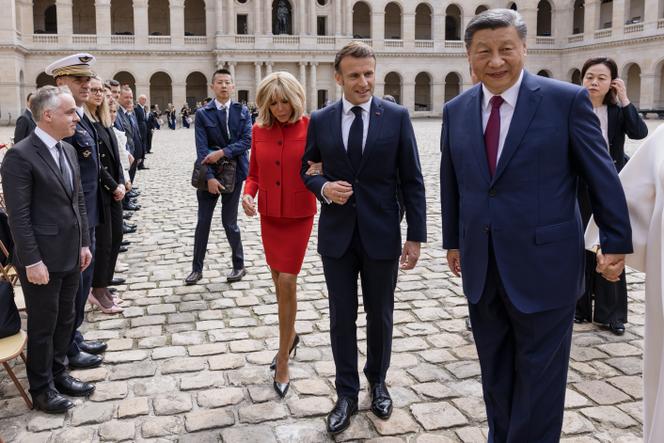


At the dinner, cognac stole the limelight, symbolizing an evening of ups and downs in the relationship between France and China. From Bernard Arnault (LVMH) to Carlos Tavares (Stellantis), some of the biggest French business leaders and a number of stars including, Sophie Marceau, Jean-Michel Jarre and Salma Hayek, flocked to the Elysée Palace on Monday, May 6, for the state dinner hosted by Emmanuel Macron in honor of his Chinese counterpart, Xi Jinping.
Earlier, the day's special guest had assured the French president that cognacs would not be overtaxed by Beijing for the time being, while his country's authorities completed an anti-dumping investigation into them. Between two toasts, and a feast complete with crab meat and Bresse chicken supreme cooked by top chefs, the evening was intended to round off the first day of a fast-paced visit, in an attempt to reconcile points of view on the hottest topics of the moment.
After a sober welcome ceremony at Les Invalides and various meetings at the Elysée, Xi and Macron called for "an Olympic truce," on the occasion of this summer's Paris Games. Their joint appeal came just hours after the announcement by the Russian Defense Ministry of upcoming new exercises designed to "practice the preparation and use of non-strategic nuclear weapons." This was dismissed as "irresponsible rhetoric" by the United States and was barely mentioned in public by Macron and Xi.
Should it be confirmed, this "Olympic truce," the principle of which is already enshrined in a United Nations resolution, could make it possible to suspend fighting at least for the duration of sporting events during the Olympic Games (July 26 to August 11), or even during the Paralympic Games (August 28 to September 8), in the hope of initiating discussions with a view to a more lasting ceasefire. Moscow has already rejected such a proposal and could take advantage of the spring season to push its ground offensive. Kyiv, which has made the withdrawal of Russian forces a prerequisite for possible talks, is also wary of a temporary pause that could make its enemy's territorial advances more secure.
This joint appeal masked deep differences between Beijing and Paris over the Russian invasion, which is shaking Europe and giving China an unprecedented say over the continent's security. "History has shown conflicts can only be resolved by negotiations," insisted the Chinese president, encouraging both sides to "resume contact and dialogue." It was his way of encouraging Kyiv's allies to show restraint in their military support, more than two months after his French counterpart did not rule out sending military reinforcements to Ukraine.
You have 61.49% of this article left to read. The rest is for subscribers only.
